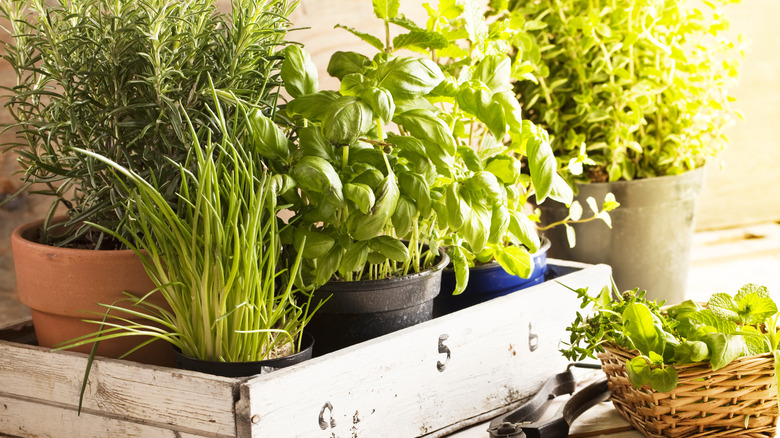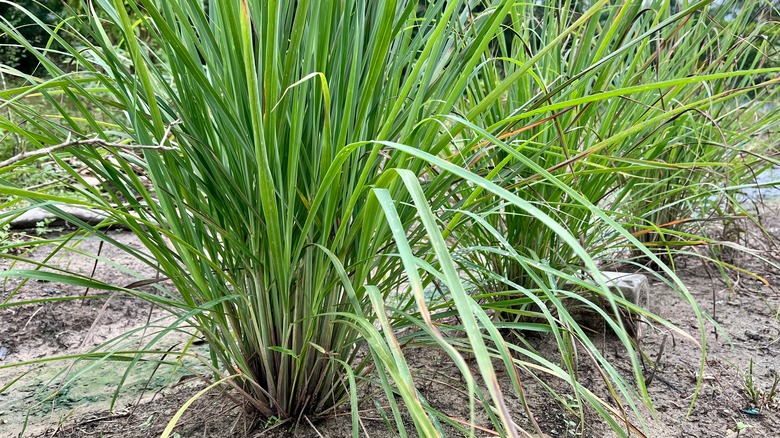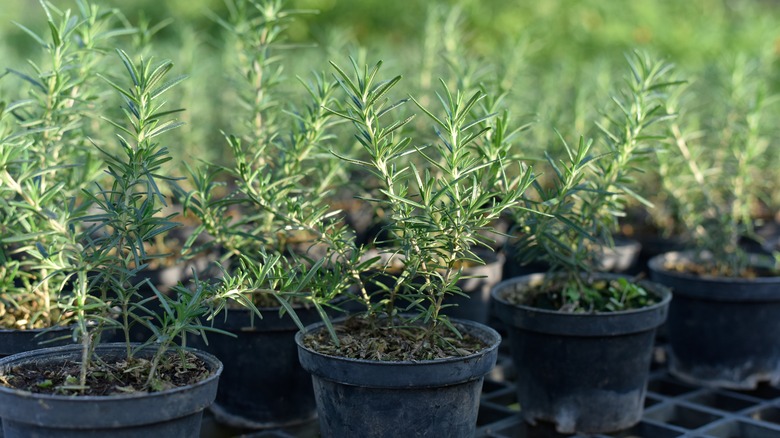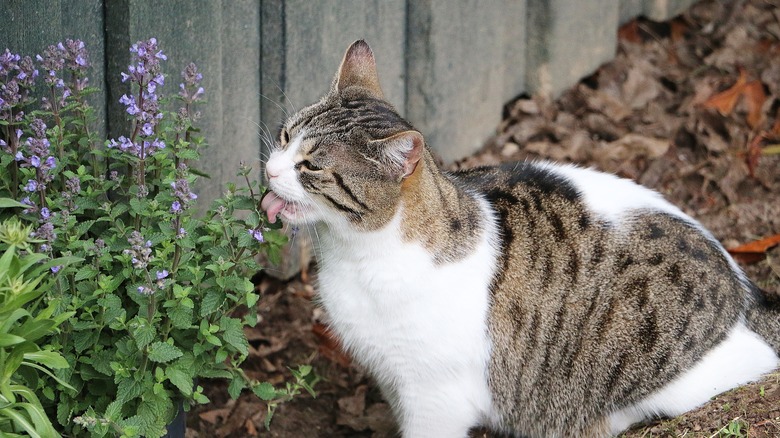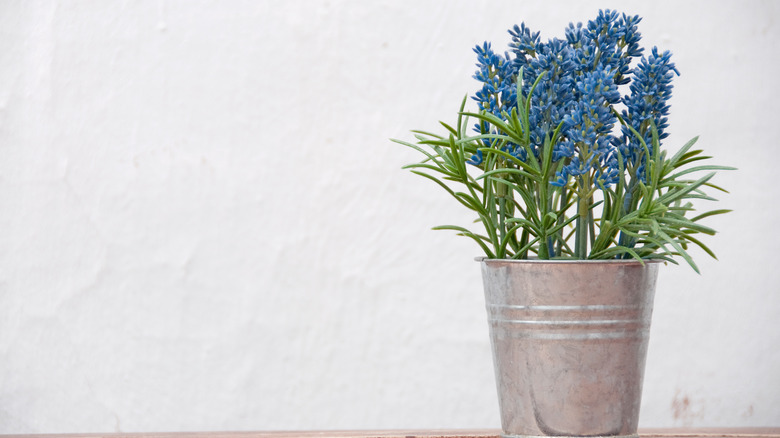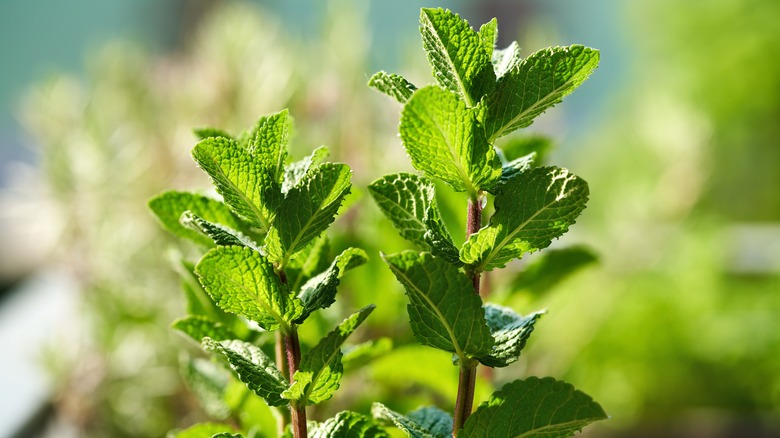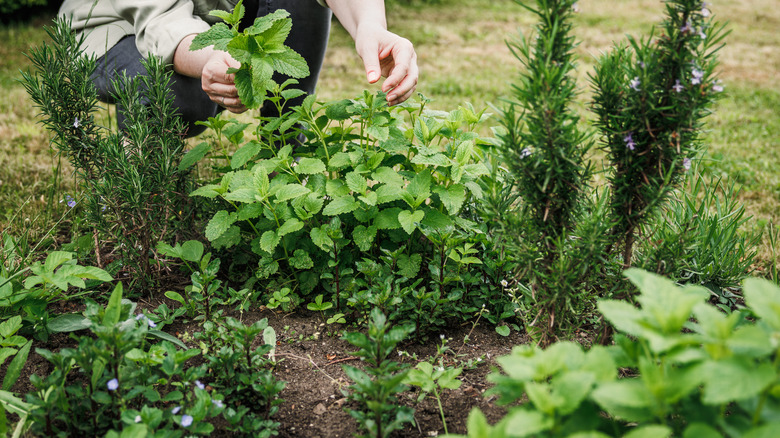Having These Herbs In Your House Will Keep Pests Far Away
Warmer temperatures mean more opportunities to open up the windows in your house and to also spend more time outdoors. Unfortunately, warm weather also means the return of many insects and other types of pests you don't want in your home. A good way to help prevent pests from getting inside your living space is to inspect your home for cracks, crevices, worn-down weather stripping, and any other small gaps they might sneak in. Aside from fixing your actual home structure, decluttering and cleaning can also thwart some of these pests.
However, pests can sneak into even the cleanest of spaces. But before you whip out a toxic-laden bug spray, you might consider the addition of herbs in your home. Specific types of herbs may help repel multiple kinds of pests, and they may also add both an aesthetic and fragrant boost. Before you purchase or grow your own herbs indoors, it's important to know which work for which types of pests, as well as the differences between relying on indoor plants versus herbal oils. Also, if you have any pets, be sure to talk with a veterinarian before using herbs in your household.
Citronella may help repel mosquitoes
In the last several years, citronella has been marketed for repelling mosquitoes, specifically citronella candles. Yet despite these claims, the American Association for the Advancement of Science reported that citronella candles don't actually help prevent mosquitoes to the extent that we're told they do. Instead, you might consider citronella plants, which mosquitoes may have an aversion to. While not completely fool-proof, citronella plants contain an oil called citronellal, which mosquitoes reportedly do not like the scent of.
The trouble is, simply setting out a citronella plant may not do enough to repel mosquitoes, because they only emit trace amounts of the oil. Instead, try taking a few leaves from the plant and crushing them in your hands to help emit the lemony-like oils in the air. Another effective method may be to use a citronellal essential oil, which you can combine with water in a spray bottle. If you do decide to keep a citronella plant in your home, know that these plants prefer warmer climates, so you may need to keep your citronella plant near a window so it can get as much sunlight as possible. They are considered perennial plants that can be replaced every spring, or you can bring outdoor potted plants inside during the winter months to protect them from frost. You can also keep citronella on a porch or in a garden, and grab a few leaves to crush when needed.
Lemongrass may be another natural mosquito repellant
Just as mosquitoes don't care for the lemon-like scent of citronellal oil emitted from citronella plants, they also purportedly avoid lemongrass. In fact, lemongrass contains the same oil as citronella, making this plant a possible alternative. In terms of its mosquito-repelling qualities, it's thought that lemongrass works by emitting citronellal oil in the same way as citronella.
If you're specifically wanting to repel mosquitoes with plants, but are looking for a more decorative plant, lemongrass might be a better choice. While lemongrass itself is used in cooking, it's also considered a "decorative grass." The downside is that it grows much larger than citronella, making it more appropriate for outdoors. In fact, according to Bonnie Plants, lemongrass grows between 3 and 5 feet tall on average! You can either plant them in a yard near windows to help repel mosquitoes, or you can keep small planters of up to 12 inches tall inside your house.
As with citronella, lemongrass prefers hot climates and requires protection against frost during colder months. Also, if you'd rather not have potted ornamental grasses in your home, you can keep lemongrass outside, but occasionally harvest some of the blades to place in decorative vases inside. Yet another alternative is lemongrass essential oil. As a 2015 study in the journal Acta Tropica found, a lemongrass oil and olive oil mixture helped prevent mosquito bites. The catch is, you'd have to apply this topically to achieve such results.
Rosemary may repel both mosquitoes and cockroaches
Often considered a cooking staple, rosemary is an herb that's prized for its pine-like scent and as a strong flavoring agent. Another good perk about rosemary? Several pests appear to despise the coveted piney scent. Rosemary is yet another plant that mosquitoes purportedly don't like due to its strong scent. Additionally, cabbage moths and flies are other flying pests that appear to have an aversion to the scent of rosemary, too. On top of this, cockroaches and ants also don't care for rosemary.
Additionally, when compared with lemongrass and citronella, rosemary may be more practical as an indoor plant to repel mosquitoes because it's a smaller, more portable plant. The downside is that rosemary does require at least 6 to 8 hours of sunlight per day, according to Maggie's Farm. Another way to care for your rosemary plant is to make sure it gets plenty of sunlight either by a window or on a patio for part of the day. Since rosemary doesn't do well in cold temperatures, this herb must be kept indoors during the winter months. First-time rosemary planters may consider starting with small plants rather than from seeds, as the latter can be challenging to germinate. Rosemary plants also thrive best in temperatures between 60 and 70 degrees Fahrenheit, according to Better Homes and Gardens.
Catnip can repel pests (while keeping your cat happy)
While you've likely heard of the euphoric effects of dried catnip, this plant has actually been used in traditional medicine for gastrointestinal issues, asthma, and other human health concerns. Despite the fact that humans and felines like catnip, there are several pests that do not. In fact, catnip is yet another herb that mosquitoes can't stand due to its scent. According to USA Today, catnip is up to 10 times more effective than DEET, a common insect repellant. For this reason, they recommend taking a few leaves off the plant and rubbing them against your skin as a natural insect repellant. Aside from mosquitoes, ants and cockroaches don't like catnip, either.
Catnip is a hardy plant that can be grown indoors and outdoors, but it tends to spread quickly outside. Aside from keeping out certain pests, this is perhaps another possible perk of keeping potted catnip indoors. The downside is that catnip prefers sunlight and lots of water. If you're considering having catnip indoors, make sure you move the plant to an area where it can get sun exposure, and be sure to water it whenever the soil feels dry. Bonnie Plants recommends harvesting catnip out of their pots once the plants have grown between 6 and 8 inches tall. You can also dry the leaves and use them in teas, or as part of your cat's toys.
Mint can prevent flying and crawling insects in your home
Mint plants may potentially prevent a variety of flying and crawling pests inside your home. While you might like mint in your tea, the fresh plant emits a scent that flies, wasps, spiders, and ants reportedly cannot stand. Placing fresh mint leaves around doors and windows may help stop them from coming inside in the first place. You can also have potted mint around your home to repel these pests without having to resort to using bug spray. As an alternative, you can use fresh mint leaves in a spray bottle full of water to create a natural spray for use around your home.
If you want to try keeping mint plants in your home, there are a few important tips to know. First, like other herbs on this list, mint thrives in well-draining soil. However, according to Country Living, mint plants tend to do best when they're exposed to four to six hours of indirect sunlight per day. Like rosemary, it's difficult to grow mint from seeds, so it's best to buy young plants and grow them in pots or directly in your garden.
Lavender may help repel flies and ants
In traditional medicine, lavender is often considered as a multi-use herb. Not only is it helpful for sleep, mood, and overall health, but lavender is also thought to have antimicrobial activities, according to the Cleveland Clinic. As a bonus, lavender may even aid in natural pest control, particularly when it comes to flies, moths, and ants. It's thought that these pests detest the smell of the oils of the plant's leaves, which happen to be the same oils humans use.
Just as lavender essential oil is a multipurpose product, you can use this plant to help repel certain pests in several different ways. The first is to place lavender potted plants around your home (but just hope that bees won't come inside, as these beneficial insects love lavender flowers!). You can also hang dried leaves around your house, particularly as a way to repel moths in your closets. If you do decide to grow lavender plants inside your home, be aware that they need a lot of natural sunlight, and it's possible to over-water them. Additionally, there's mixed evidence that lavender plants may be toxic to cats and dogs, so you'll want to be sure you keep them out of reach of your fur babies.
Eucalyptus may be a multipurpose method of keeping pests away
Eucalyptus, like lavender, offers numerous health benefits to humans, such as pain relief, immune support, and cold treatments. Unlike some of the other herbs on this list, though, the U.S. actually recognized eucalyptus as a natural bug repellant several decades ago. According to Medical News Today, eucalyptus was officially registered as a method of repelling ticks and mites. It's also thought that eucalyptus oil may deter mosquitoes more specifically, though most insects reportedly don't like the scent of this plant and may stay away from it.
To that end, there are several ways you can use eucalyptus in your home to help repel insects. First, you may consider displaying dried eucalyptus sprigs throughout your home, or you can also add eucalyptus leaves to a water and witch hazel mixture to create your own bug spray against ants. Alternatively, you can add a few drops of eucalyptus essential oil to water in a spray bottle to create a similar repellant. Finally, if you want to grow eucalyptus plants inside your home, know that it prefers a lot of sunlight, but little water. Also, like lavender, eucalyptus can be toxic to pets, and even humans as well. These are important considerations for households with pets and/or small children.
Peppermint repels a variety of insects and rodents
Several pests have aversions to many plants in the mint family, including peppermint. While mint may help ward off a variety of crawling and flying insects in your home, peppermint is particularly useful for cockroaches and rodents. Aside from cockroaches, the strong smell of peppermint also repels fleas and moths. Additionally, rodents abhor the smell of peppermint, particularly mice.
Peppermint is relatively easy to keep in your home, because it can grow quickly with partial sunlight. However, peppermint plants still crave a lot of water, so you'll need to check your potted plants often. If you prefer not to have to maintain peppermint plants in your home, know that these also do well outdoors in full sunlight, but you still need to keep them in containers to help prevent the plants from overcrowding the rest of your garden. You can gather leaves from the plants or use peppermint essential oil combined with water to create your own natural bug spray and rodent repellant, if you prefer to not mess with the hassle of quick-growing plants of this nature.
Bay leaves may repel cockroaches
Bay leaves can be used for more than cooking sauces and stews. These leaves come from the bay laurel, a shrub that's indigenous to the Mediterranean area that may be grown inside homes and outdoors in gardens. Aside from the aesthetic appeal of this shrub-like plant, it may also repel cockroaches. It's thought that cockroaches avoid eucalyptol, a type of naturally-occurring oil in laurel bay leaves.
However, if you do grow bay leaf plants indoors, keep in mind that they must be placed in small containers to prevent them from growing too large. According to Maggie's Farm, bay laurel shrubs may grow as large as 50 feet high outdoors. Also, as this plant is native to Mediterranean regions, it thrives best in sunlight and warm temperatures. As an alternative to growing bay leaf plants, you can also use dried bay leaves from a grocery store by placing them around doors and windows to help keep bugs from wanting to come inside your home. Another caveat to planting bay leaf plants inside your home is that they might possibly attract beetles. While cockroaches hate bay leaves, beetles like these plants, and are known to lay eggs in their stems.
Lemon balm plants may keep spiders away
While several herbs are said to help keep ants, flies, and cockroaches away, many of the options on this list may also repel spiders. Yet another option is lemon balm, which gives off a lemon-like scent that spiders reportedly hate. Despite its citrusy name, lemon balm technically belongs to the mint family, and it is indigenous to the warm regions of North Africa and southern Europe. The fact that lemon balm does well in warm climates also makes it versatile and hardy in a variety of temperatures, but it doesn't thrive outdoors during the winter months.
The good news is, unlike lemongrass, lemon balm is relatively easy to plant and maintain indoors. It's so popular that, according to the University of Wisconsin-Madison, lemon balm was declared as the "Herb of the Year" in 2007 by the International Herb Association. If you'd rather keep your lemon balm plants outdoors, you can still use their leaves to help repel spiders from inside your home. Simply pick off a few leaves and add them to a spray bottle full of water, and then use as needed. This solution works well when sprayed into dark crevices where spiders might enter your home or hide out.
Basil may help keep flies away from your home
Fresh basil is often desired by home chefs, and you might know of friends or relatives who cook using basil from their own gardens. Aside from its pungent aroma and spicy-sweet flavor, basil plants may have other uses, too. This includes repelling flies, who purportedly dislike the strong smell of basil leaves. In fact, though the exact science is unclear, it's thought that the use of basil as a natural pest control method dates back to ancient times, according to Gardening Know How. Aside from flies, other flying pests, such as gnats, are also thought to dislike the scent of basil.
If you're interested in having basil in your kitchen to help keep flies out, you can place a small container on your counter or windowsill. Placing potted basil by a window also allows the plant to get the sunlight it thrives on. As Bonnie Plants notes, basil needs between six and eight hours of direct sunlight for proper growth. You'll also want to make sure the planters drain well. If you prefer not to grow basil plants in your home, you may consider picking basil leaves from your outdoor garden and then placing them around your kitchen to deter flies from invading your cooking spaces.
